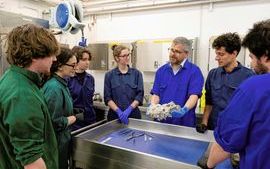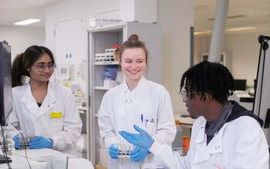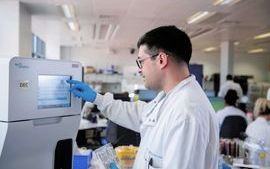- Published:
- 22 April 2025
- Author:
- Dr Bernie Croal
- Read time:
- 7 Mins
The theme of this edition of the Bulletin is training and education in pathology. Clearly, the future of pathology and, indeed, healthcare depends on the training and retention of future pathologists and scientists. There are, however, many challenges, trends and changes that are crucially impacting the ability of the UK healthcare system to keep up and ensure the pathology supply–demand equation is balanced.
The delivery of pathology is changing, with an increasing number of private sector services supporting both private sector healthcare and NHS-based services beginning to evolve. Pathologists are also delivering much more of their work via private sector portals, both as primary employment and as additional private sector work. As this shift continues, we need to ensure that teaching, training and research functions are protected and are not lost or left to those working within the NHS sector alone.
Specialty training pathways for both pathologists and clinical scientists appear to be inadequate. We don’t know for definite because there is no workforce planning done for pathology – no one is counting the number of consultant posts, potential retirements, attrition rates to the private sector or abroad and, of course, the increasing future denominator that is workload. The College is trying to do this via our recent survey, which has just breached a 30% response rate from our members, a very strong response. This information, along with other data sources, will enable the College to lobby harder for more training posts and better retention. We will also develop guidance on contingency planning, should the inevitable shortfalls continue to emerge.
Training pathologists and scientists needs trainers but also, crucially, a well organised, funded and stable oversight body. This is currently provided by NHSE, working with equivalent bodies in the devolved nations. NHSE has in recent years faced huge budget cuts and last month the Government announced its abolition. What remains unclear is what functions will transfer to the Department of Health and Social Care and in what form, and how this transition will occur. Meanwhile, additional funding for training is unlikely given the state of the economy, and a long-term workforce plan that actually deals with specialty training or workforce planning seems a long way away.
Then there are exams… with the high cost to trainees and to colleges, and increasing difficulty in securing examiners and panel chairs – all voluntary, of course. The recent MRCP error has had a significant impact for affected trainees, and we await the outcome of the external review commissioned by the Federation of the Royal Colleges of Physicians. As a college, we are increasingly aware of the challenges of delivering high-stakes examinations and relying on volunteer examiners to do so. We are working through the Academy of Medical Royal Colleges to explore what can be done to address these concerns. Note that our College makes no profit from exams.
Meanwhile, global economies are under huge threat and healthcare budgets seem even more unlikely to cope with demand. The viability of UK pathology services is now at significant risk.
So how can we fix this? Where does that responsibility lie? Certainly, sitting back and waiting for things to fail just to say ‘told you so’ is not going to help any of us, our services or patients. We are all responsible – trainees, trainers, pathologists and scientists working in pathology across both the NHS and the private sector. We all need to step up… our professional wellbeing depends on it, our healthcare depends on it and patient care depends on it.
The College has not been sitting on its hands – we have seen this coming and have been tooling up the necessary skills, insights, connections and data that we will need to make a stronger impact. Our new College Workforce Strategy focuses on train, retain, reform and contingency, with new ways of data collection to fuel those workstreams. This important piece of work will drive and enhance lobbying, guidance and standards. It will equip the College to step in when necessary to help fill gaps, such as those developing as a result of the NHSE transition.
We are also beginning to develop our own Pathology Plan – a plan for pathology, by pathology, identifying what pathology can do, what solutions it brings and ensuring it lines up with other initiatives, such as the NHS 10-year Health Plan. In addition, our new collaboration with industry is vitally important so that the profession and industry can be a louder, stronger and more informed voice.
We have also been restructuring our committees to better fit the needs of the changing landscape – for example, a new committee network for informatics, digital and AI across our disciplines is underway. Meanwhile, our New Consultants Committee, coming in imminently, will focus on issues important to them, while encouraging future leaders. A strengthened and more joined up Pathology Alliance, working across associations and industry partners, also strengthens the pathology voice. Next on the list is diagnostic stewardship, quality and patient safety, and sustainability… The list goes on. But to do all this, the College needs its members, both financially and to volunteer – so, what can you do?
You can support the College, become and stay a member or fellow, volunteer for many of the critical roles and tasks, whether job planned or not. This is a big ask for many, but we really need it. Support and help implement the guidance, standards and great innovations and ideas that come from the College through its webinars, publications, meetings and the Pathology Portal. Work locally to lobby for pathology, for the College and for our own professional wellbeing.
You can, of course, choose to not do any of this, but unless we have a critical mass of members contributing financially through membership and getting involved, then many of the core functions that define our profession will be under threat and lost. Then we will all be affected.
The coming years will be very difficult across healthcare and across pathology. As a college, we will strive to find solutions and drive leadership, but we will also support our members. We often say, ‘but we are not a trade union’ – true, but we can still ensure we stand up for the wellbeing of pathologists and scientists, for pathology and for patients.
The Royal College of Pathologists is more important than ever – join us, stay with us and work with and for us… be the College.
The government announcing the abolition of NHSE last month, while not coming as a complete surprise for many, has nevertheless brought about much concern and uncertainty. Bringing control of the NHS in England back to Government (DHSC) again will align with what already exists across the other 3 nations of the UK. However, while some of the dust has settled, it is far from clear.
It has been said that many of the important and vital functions that NHSE carries out will continue under the DHSC, but it is not known when, by whom and how these services will be run. Substantial job losses and budget reductions will undoubtedly impede and even pause many of the current functions, with others disappearing altogether. NHSE has a significant stake in the running and oversight of pathology services across the NHS in England. Add to this the important roles across training, recruitment, genomics, GIRFT and the NHS App. Many of those in senior positions within NHSE have either gone or have announced they are leaving. Many others face the uncertainty of changing roles or losing their jobs. This will inevitably disrupt services.
Our message to government is clear: we are able and prepared to contribute and collaborate during the transition and beyond to ensure vital NHS functions and services are not lost. This represents a major opportunity for the profession to step up and ensure that the many pathology-related workstreams continue. NHSE pathology teams, pathology networks oversight, the Quality Assurance Dashboard, the Clinical Advisory Group for Paediatric and Perinatal Pathology, the Pathology Portal and pathology coding workstreams are some of many existing entities supporting pathology services run through NHSE.
The next few years are clearly going to be unstable and disruptive; however, what emerges will hopefully put clinical and scientific oversight at the heart of pathology services. The College aims to be a significant part of that.
Read next
From the Trainee Section Editor
22 April 2025
College Workforce Strategy 2025–2028
22 April 2025




